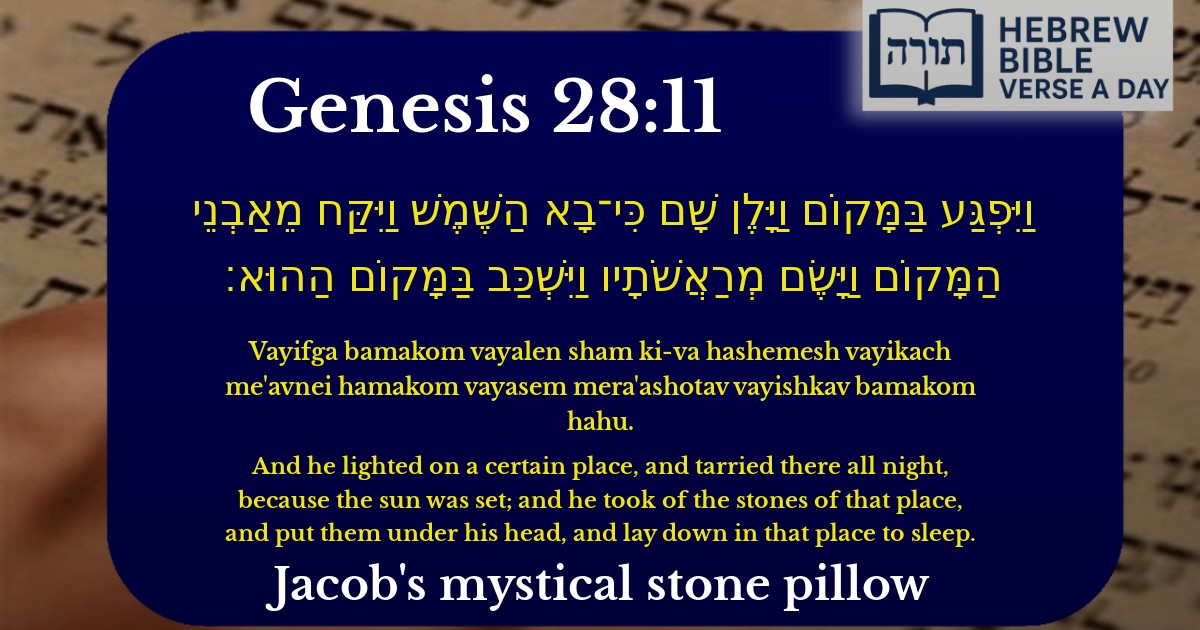Join Our Newsletter To Be Informed When New Videos Are Posted
Join the thousands of fellow Studends who rely on our videos to learn how to read the bible in Hebrew for free!
Hebrew Text
וַיִּפְגַּע בַּמָּקוֹם וַיָּלֶן שָׁם כִּי־בָא הַשֶּׁמֶשׁ וַיִּקַּח מֵאַבְנֵי הַמָּקוֹם וַיָּשֶׂם מְרַאֲשֹׁתָיו וַיִּשְׁכַּב בַּמָּקוֹם הַהוּא׃
English Translation
And he lighted on a certain place, and tarried there all night, because the sun was set; and he took of the stones of that place, and put them under his head, and lay down in that place to sleep.
Transliteration
Vayifga bamakom vayalen sham ki-va hashemesh vayikach me'avnei hamakom vayasem mera'ashotav vayishkav bamakom hahu.
Hebrew Leining Text
וַיִּפְגַּ֨ע בַּמָּק֜וֹם וַיָּ֤לֶן שָׁם֙ כִּי־בָ֣א הַשֶּׁ֔מֶשׁ וַיִּקַּח֙ מֵאַבְנֵ֣י הַמָּק֔וֹם וַיָּ֖שֶׂם מְרַֽאֲשֹׁתָ֑יו וַיִּשְׁכַּ֖ב בַּמָּק֥וֹם הַהֽוּא׃
וַיִּפְגַּ֨ע בַּמָּק֜וֹם וַיָּ֤לֶן שָׁם֙ כִּי־בָ֣א הַשֶּׁ֔מֶשׁ וַיִּקַּח֙ מֵאַבְנֵ֣י הַמָּק֔וֹם וַיָּ֖שֶׂם מְרַֽאֲשֹׁתָ֑יו וַיִּשְׁכַּ֖ב בַּמָּק֥וֹם הַהֽוּא׃
🎵 Listen to leining
Parasha Commentary
📚 Talmud Citations
This verse is quoted in the Talmud.
📖 Chullin 91b
The verse is referenced in a discussion about Jacob's actions and the significance of the stones he used as a pillow.
📖 Berakhot 26b
The verse is mentioned in the context of discussing the times for prayer, particularly the evening prayer, which is linked to the time when Jacob lay down to sleep.


The Setting of Yaakov's Journey
The verse describes Yaakov Avinu's stop at a certain place (הַמָּקוֹם) on his journey to Charan. Rashi explains that this location was Mount Moriah, the future site of the Beit HaMikdash, as the Torah uses the term "הַמָּקוֹם" (the place) which often refers to this sacred location (based on Bereshit Rabbah 68:9). The sun setting prematurely, according to Midrash, was a Divine act to cause Yaakov to stop at this holy site (Pirkei D'Rabbi Eliezer 35).
The Stones Under Yaakov's Head
Yaakov took stones from the place to place under his head. The Talmud (Chullin 91b) discusses how these stones quarreled, each wishing to have the tzaddik's head rest upon it, until Hashem fused them into one stone - symbolizing unity among the Jewish people. Ramban adds that these stones represent the future twelve tribes descending from Yaakov, which would emerge unified in their service of Hashem.
Significance of the Sunset
The mention of the sun setting carries deeper meaning. Sforno explains that the premature sunset demonstrated Divine Providence - Hashem arranged for Yaakov to stop specifically at this holy place to receive prophecy. The Kli Yakar connects this to the concept that night represents exile, and Yaakov's lying down foreshadowed the future exiles of his descendants, with the stones representing their protection.
The Term "Vayifga" (וַיִּפְגַּע)
This word can mean both "encountered" and "prayed." Rashi cites both interpretations: that Yaakov physically arrived at the place, and alternatively that he prayed there (based on Yerushalmi Berachot 4:4). The Midrash (Bereshit Rabbah 68:10) states this establishes Ma'ariv as an obligatory prayer, as Yaakov instituted evening prayer at this time.